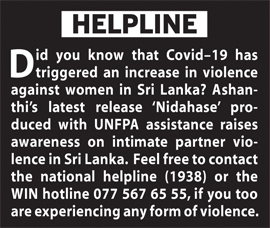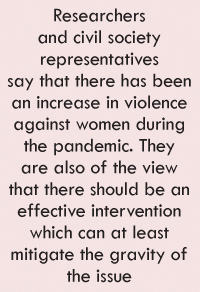
Hobson’s choice
 With the outbreak of the Covid-19 pandemic, the governments of many countries gave “stay at home” orders. Some countries even ordered a complete nationwide lockdown. Although these steps were needed to stop the spread of Covid-19, this Hobson’s choice has brought out some negative consequences in different areas in which violence against women, notably domestic violence against women is one of the central concerns in many countries including Sri Lanka.
With the outbreak of the Covid-19 pandemic, the governments of many countries gave “stay at home” orders. Some countries even ordered a complete nationwide lockdown. Although these steps were needed to stop the spread of Covid-19, this Hobson’s choice has brought out some negative consequences in different areas in which violence against women, notably domestic violence against women is one of the central concerns in many countries including Sri Lanka.
Domestic violence can generally be defined as conduct or commission which eventually results in physical, verbal, sexual, emotional and economic abuse. This can also range from insults, controlling behaviour, humiliation, and physical to sexual violence.
 As declared by past studies, there remains a considerable association between the exposure to natural calamities or other extreme situations and the increase in the rate of violence against women. Amidst the Covid-19 pandemic, the reasons, contributing to violence against women can be multifaceted and precipitated. They may arise due to a vast number of interdependent reasons such as stress, owing to physical confinement, economic disruption, unemployment, scarcity of basic provisions and limited social support.
As declared by past studies, there remains a considerable association between the exposure to natural calamities or other extreme situations and the increase in the rate of violence against women. Amidst the Covid-19 pandemic, the reasons, contributing to violence against women can be multifaceted and precipitated. They may arise due to a vast number of interdependent reasons such as stress, owing to physical confinement, economic disruption, unemployment, scarcity of basic provisions and limited social support.
Two pandemics
Following WHO’s statement on March 11, 2020, characterising Covid-19 as a pandemic, Governments and health authorities across the world either introduced or intensified restrictive social distancing measures in order to reduce the spread of the virus. It is noted that these measures had a drastic negative impact on the income of the families, well-being, interpersonal relationships and mental health.
The general secretary of the United Nations has declared violence against women as a global pandemic. The two pandemics; Covid-19 and violence against women aggravate the issues, related to the health and well-being of people, women in particular.
The researchers are of the opinion that hazards affect men and women differently. As a whole, during the pandemic, gender inequalities in some societies for girls and women become worse and it may also have an impact on how they receive care and treatment.
Researchers and civil society representatives say that there has been an increase in violence against women during the pandemic. They are also of the view that there should be an effective intervention which can at least mitigate the gravity of the issue. Past epidemics such as Ebola and Zika suggest that violence against women might shift in nature and are outbreaks which affect the social and economic lives of people of either gender.

More than half of the world’s population have been asked to work from home to reduce the spread of Covid-19. Under these circumstances, the women who are already in abusive relationships or at the risk of such abuse may find that staying at home would increase their possibility of getting caught with intimate partner violence. Urgent steps are required to address the risk of violence, encountered by women.
Say “No”
Being in contact with the aggressor for a long period can be considered as a factor which leads to violence. Apart from that, the reduction in social contacts of the victims with their families and friends may also be another contributory factor for violence against women. The possibilities that women have to create a social support network, seek support and escape from the violent situation are also reduced.
For example, around the clock contact on a daily basis, given to low income families, living in housing apartments with few rooms and overcrowding should also be taken into account while having due concern on the negative impact on the reduction of possibilities for a woman to file a complaint safely.
Meanwhile, there are some factors contributing to the aggravation of violence against women; the aggressor’s huge stress owing to the fear of falling sick, the difficulties in having social contact, uncertainties about the future, threat of reduced income and intoxication.
The woman overloaded with the house work while taking care of her young children, while having to look after the sick and elderly family members may reduce her ability of avoiding conflict with the aggressor. And in addition, it would leave her more vulnerable to psychological and sexual violence.
The woman’s fear of violence also affects her children as well. Being confined to the house is another major factor which hinders her search for help. Also the woman’ s dependence on her husband mostly due to economic stagnation and the inability of getting involved even in informal work, restricted by quarantine during the pandemic reduces her chances of breaking away from this pressure.
